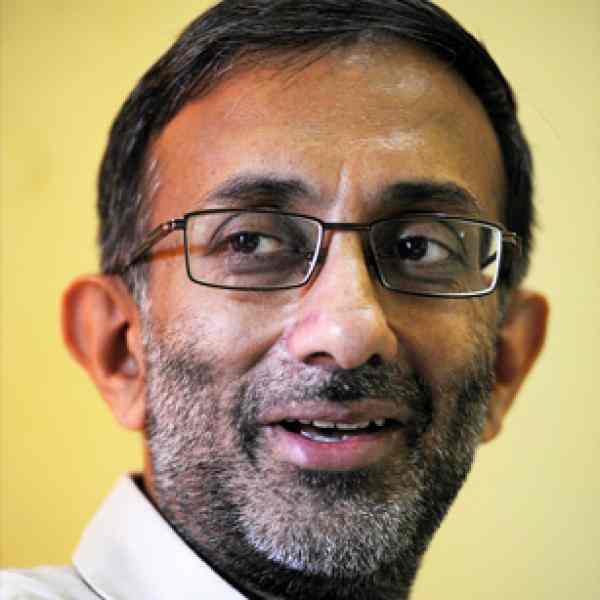Introduction
Dr Manoj Kumar has created a free, comprehensive, community-based, volunteer-led and cost effective mental health care system to cater to those from the most economically backward groups of society. In doing this, he has paved the opportunity for a meaningful and productive new life to those individuals considered as incurable or a burden to society.
The New Idea
To ensure that quality, comprehensive mental health care is delivered to the most economically backward people and resource-scarce places, Dr. Manoj Kumar believes the role of medical professionals has to be shifted from sole providers of care to facilitators of community-based models and strategists for larger ecosystem shifts.
With a focus on optimising dwindling resources in mental healthcare delivery and being cost-effective, Dr Manoj is using unique interventions such as task sharing and innovative technologies through tele psychiatry to create a decentralized and community driven system of care to the poorest of people across India. Identifying that currently medical professionals such as psychiatrists don’t need to be the sole providers of care, Dr Manoj through his model is able to shift all rehabilitation and recovery roles to trained non-professional medical health workers and brand new cadres of community based volunteers, hitherto only done by psychiatrists. By leveraging existing institutions like the widely distributed Palliative Care Centers, Primary Health Centers and other independent Civil Society Organisations, he is tying in other medical care with mental health treatment, thus negating any stigma towards treatment. He is also thus reducing the cost per patient by up to 70% per patient per year. Through this new type of ‘quality care’, patients who have previously never been treated for their illness or have been disillusioned by the existing services, have been given the opportunity to have broad based support through trusted networks of people and close to source.
Dr Manoj has now created a demand for this type of community-owned & driven care throughout the state of Kerala. There has been demand shown across the country to replicate this model in resource-scarce areas, including tribal communities and Dr Manoj is leveraging his platform as a thought leader in the field in India to scale the idea.
The Problem
Mental Healthcare has been a focal talking point recently amongst health care planners, professionals and the general public. With the ratification of the UN Convention on the Rights of Persons with Disabilities including people with mental disorders and groups like the World Health Organisation (WHO) advocating for stronger national policies, there has been a boost to the rights of people with mental conditions. In India itself, a National Mental Health Policy has been in place since 2014 and the District Mental Health Care Program (DMHP) operating since 1996.
Despite all of this, the on ground realities as far as access, quality and affordability of services has been dismal. Even though the DMHP has managed to cover over half the districts across India and most medical colleges and district hospitals now have psychiatric wards, there still exists an overwhelming 90% treatment gap. Driving this gap is the logistical and geographical barriers that exist with patients having to travel long distances to access psychiatric treatment at any of the 43 large district mental health hospitals - with a majority of the limited trained medical professionals being clustered in urban settings. Even after overcoming these barriers, most patients are treated in overcrowded outpatient settings, bereft of privacy and quality care.
Exacerbating this already inadequate system is the inclination towards biomedical models of care as opposed to any psychological care - with access to rehabilitation and recovery being alien to most patients. This system of care which overmedicates individuals often leads to discontinuous treatment as outpatient consultations and inpatient treatments stop when symptoms start residing. However, for the majority of mental health patients, their diagnosis is chronic with remission and relapse often common; this leads to further alienation from the psychiatric system from patients who have not been cured but rather treated as a patient of an acute illness. For the most economically backward citizens in India, the only viable options for treatment come from the private sector - further burdening the already improvised families through highly expensive treatment options.
Without decentralized, decriminalized, de-medicalized and destigmatized models of care in place that are cost effective, mental health will continue to be a growing cost to India’s social and economic future.
The Strategy
With a non-compromise on ‘Quality Care’ to all patients, meaning everything from diagnosis to medication and any other support with the least side effects and as close as possible to source, Dr Manoj’s first point of intervention began with identifying that existing community resources needed to be utilized to make his intervention work. He thus partnered with community palliative care and primary health care centres across the state of Kerala to tap into existing cadres of non-medical health professionals such as Asha workers and community
volunteers. These centres are independent from his organization, Mental Health Action Trust (MHAT) in that the ownership, operations and resource-mobilization is taken on by the community themselves. This is vitally important for both the care; as it is localized and patients are more adherent to the destigmatized, de professionalized and comprehensive care model, as well as for sustainability; as communities feed off a sense of ownership through mobilizing resources and taking on much of the recovery care work that happens.
Once community centres are established, MHAT sets standards and protocols by which to follow, with the community then themselves creating an action plan to move forward. This works because aside from medication and the initial diagnosis, the therapeutic, rehabilitation and most importantly, recovery work, can be done by skilled, trained and well supported people within communities. This innovative way of looking at mental health treatment is called Task Sharing, where limited resourced settings are able to be transformed into optimized and efficient systems of care. The role of the psychiatrist and medical professionals does not at all diminish, it is now redefined to becoming trainers, standard setters and advocates for a push towards community based care. For example, instead of having to do weekly home visits to patients, Dr Manoj can now work with community centers to strategize how to negotiate with pharmaceutical companies to get subsidized prices for medicine.
Once community centers identify patients who live below the poverty line and are severely mentally ill, a local volunteer who is often a very unexpected source, such as a Rickshaw Puller, is assigned as the local support partner. These volunteers are largely responsible for home visit supports, psychosocial rehabilitation, family group therapy, economic empowerment and the formation of self-help groups – through the support of non-professional psychologists and social workers. This form of care, which is largely focused on recovery; that is ensuring that all patients get to their full potential and not just rehabilitation; where patients can function again, is alien. By having such comprehensive and constant support mechanisms, the patient is not disillusioned from start-stop therapies or left alone with only some level of rehabilitation care, which most community based models currently do.
Once volunteers are assigned, an outpatient visit is organized to initially diagnose the patient, now increasingly through tele psychiatry – where medical professionals who legally are only allowed to prescribe medication, can do their initial assessment through video conferencing or telephone. This fundamentally shifts the dynamics of care, creating an efficient process by which the patients from most rural areas can get support. The local volunteer then becomes the point of contact and lead owner of the case, ensuring that treatment plans are moving ahead accordingly and the needs of patients are being met. With strong protocols and practices in place, volunteers always have the support of MHAT staff and other non-medical professionals to access through the local community centres.
With the belief of holistic care, community centres run day care centres to provides safe spaces for patients to develop skills and behaviors that they have lost to years of silent suffering. For example, in Mallipurum, a lady who has been living in the dark for 20 years in her room, is now learning how to walk again in a straight line through fun and innovative activities run by community volunteers at the day centres. The care also extends to family group therapy and the formation of self-empowerment groups among families. Moderated by community volunteers, these spaces are becoming vital to strengthening support systems across local communities. In fact, many of the volunteers at the centres across north Kerala are recovered patients and their family members who have been careers. As well as this, community centres which are most often run by diverse locals such as housewives, chai-wallahs and farmers; then focus on economically empowering these patients through linking them to local sources of employment.
This innovative and decentralized model of care, which provides comprehensive care to the most severely ill patients, is one that has now been independently supported by community groups across the state of Kerala. Over 55 groups now exist across 5 different districts with more than 3500 patients being seen. More importantly, given the quality, effectiveness and localized support given, dropout rates through the process is below 5% for most centres – far better than traditional alternatives. Dr Manoj has extensively documented the process it takes to start a community center and for this method of intervention to be replicated. It has been replicated across Kerala and Delhi with many significant organizations such as NIMHANS (National Institute of Mental Health and Neurosciences) looking to replicate the community model. MHAT has now started an independent training course and center with Tata Institute of Social Sciences to upskill volunteers according to their growing interest in this area.
The Person
Dr Manoj recalls his father as being the biggest influence in his life growing up, with his occupation as a judge influencing the values of justice and empathy around the family. Attending court sessions and shadowing his father from a young age, Dr Manoj himself started to believe that all decisions that he is required to make should be out of goodness, fairness and justice. These early experiences led Dr Manoj to become a naturally inquisitive student and observer, where he always would question the status quo and try to understand why things were the way they are.
This continued with his journey into Medical College where he started questioning the corrupt, broken systems where commercial considerations were often given onus over ethics - especially in psychiatry. His concerns however strengthened his resolve to want to engage with psychiatry, with a deep belief that the traditional ways of treating the mentally ill by locking them up in jail cells and overmedicating them, needed to be changed. This brought Dr Manoj to do his MD at CMC Vellore, which he accounts as having the most professional and immersive learning experience in his lifetime - one which enabled him to
practice medicine based on what was taught and without any undue influences. It is here as well that he was able to establish a broadened understanding of psychology, with experiences working with Palliative and Cancer patients and their mental health. Even within these existing institutions that were caring for patients, Dr Manoj started seeing an uncomfortable pattern when it came to mental health treatment - it was inaccessible, inefficient, inhumane in practice and costly. This was especially apparent to Dr Manoj when it came to the lowest strata of society, where the severely mentally ill from the poorest of families in India have little to no care at all.
A turning point in Dr Manoj’s life came when his mother passed away from cancer, bringing a realization that even though she received the best possible medical care, she was not taken care of psychosocially. These experiences and the uncompromising belief in social justice, led Dr Manoj to the start of a lifelong commitment to find a solution to help those completely forgotten in an already inefficient system, get access to quality and comprehensive mental health care when needed




